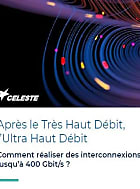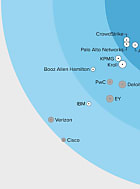Bugs sur Internet Explorer: 'extrêmement' critiques ?
Secunia, société de sécurité informatique, annonce la présence d'une série de cinq bugs 'extrêmement' critiques sur Internet Explorer, versions 6, 5.05 et 5.01

Compromettre sa machine en utilisant Microsoft Internet Explorer, avec des menaces aussi néfastes que la possibilité d'outrepasser les mots clés, l'exposition des informations contenues sur le poste, redirections ou détournements sous Windows. Le navigateur Internet Explorer de Microsoft recèlerait encore bien des surprises !
La société Securia révèle qu'IE 6, 5.5 et 5.01 présenterait pas moins de cinq failles de sécurité, des 'bugs' que le spécialiste de la sécurité qualifie d'extrêmement critiques. Plus d'informations sur le site de Securia Quant à la solution à apporter dans l'immédiat, en l'absence de 'patch', Securia propose deux alternatives : désactiver Active Scripting, ou? changer de navigateur ! En cas de dysfonctionnement du lien, voici les recommandations
Internet Explorer System Compromise Vulnerabilities Secunia Advisory: SA10289 Release Date: 2003-11-25 Critical: Extremely critical Impact: System access Exposure of sensitive information Cross Site Scripting Security Bypass Where: From remote Software: Microsoft Internet Explorer 5.01 Microsoft Internet Explorer 5.5 Microsoft Internet Explorer 6 Description: Multiple vulnerabilities have been identified in Internet Explorer, which in combination can be exploited to compromise a user's system. 1) A redirection feature using the « mhtml: » URI handler can be exploited to bypass a security check in Internet Explorer, which normally blocks web pages in the « Internet » zone from parsing local files. 2) The above redirection feature can also be exploited to download and execute a malicious file on a user's system. Successful exploitation requires that script code can be executed in the « MyComputer » zone. 3) A cross-site scripting vulnerability can be exploited to execute script code in the security zone associated with another web page if it contains a subframe. This may potentially allow execution of script code in the « MyComputer » zone. 4) A variant of a fixed vulnerability can still be exploited to hijack a user's clicks and perform certain actions without the user's knowledge. For more information: https://www.secunia.com/advisories/9711/ 5) An error in the download functionality can be exploited to disclose a user's cache directory by supplying a « HTM » file extension and an invalid value in the « Content-Type: » header field. This issue does not affect all versions and may have been fixed by the latest patch for Internet Explorer. The vulnerabilities have been reported in Internet Explorer 6.0. However, other versions may also be affected and have been added due to the criticality of these issues. PoC exploits (Proof of Concept) are available. Solution: Disable Active Scripting. Use another product. Reported by / credits: Liu Die Yu
Sur le même thème
Voir tous les articles Cybersécurité








